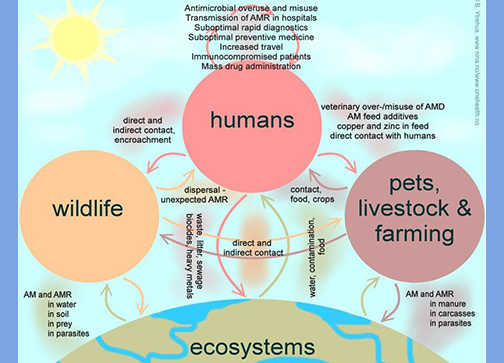One Health interprofessional stewardship to combat antimicrobial resistance
Amy M. Sjoberg, Claire L. Fellman, Ian M. DeStefano, Sarah M. Langfitt, Madeleine R. Stein, Manlik Kwong, Kirthana Beaulac & Shira Doron
Nat Med. 2023 Jan 19. Online ahead of print.
PMID: 36658426 | DOI: 10.1038/s41591-022-02173-8
Abstract
Multidrug-resistant organisms are a growing concern, threatening the effectiveness of life-saving antimicrobials around the world. Those that are considered “urgent threats” by the US Centers for Disease Control and Prevention are found in both humans and animals, illustrating the importance of a One Health approach to mitigating antimicrobial resistance1,2,3. Antimicrobial stewardship is the coordinated effort to optimize the use of antimicrobials to minimize adverse events, excess costs and the development of resistance while improving health outcomes. To date, most veterinary antimicrobial stewardship efforts have focused on food animal medicine, rather than companion animal medicine, since the largest volume of antimicrobials is used in animal agriculture. Importantly, however, studies increasingly recognize that resistant bacteria can be transmitted between companion animals, such as dogs and cats, and their human owners, and that pets can act as a reservoir for multidrug-resistant organisms that affect human health4,5. Given this evidence and the use of similar antimicrobials in human medicine and companion animal veterinary medicine, we believe there is an urgent need for enhanced antimicrobial stewardship and training within companion animal medicine.
Since 2016, researchers and clinicians from the Tufts University School of Medicine/Tufts Medical Center and Cummings School of Veterinary Medicine/Foster Hospital for Small Animals have worked collaboratively on translational research and quality improvement initiatives around antimicrobial use in companion animal veterinary medicine. In the summer of 2022, an interdisciplinary team dedicated to improving antimicrobial stewardship for humans and companion animals was created. Goals of the collaboration included sharing best practices between hospitals to generate ideas for new stewardship initiatives, developing a shared research agenda and educating the next generation of champions of One Health and antimicrobial stewardship through the inclusion of both a medical student and a veterinary student on the team. Over the course of 3 months, the students spent time in human infectious disease clinics and intensive care unit clinical rounds while also participating in both human and veterinary hospital pharmacy operations, infection-prevention rounds and antimicrobial stewardship meetings.





